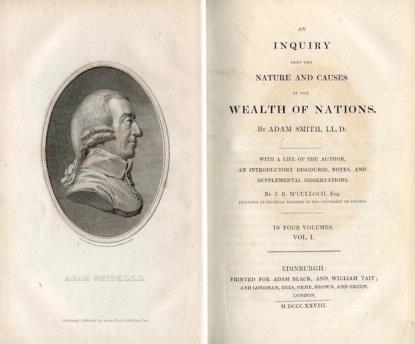
Patriot’s Day and the Boston Marathon celebrate American values and resilience, which were tested on April 15, 2013. Many people in Boston felt violated by those bombs, but, ultimately, the terrorists lost, not because they were killed/captured relatively quickly but because within an instant of the first bomb Boston and the nation responded as a community.
There is no perfect security against such insidious attacks. But it is possible to maintain and even increase the probability of similar heroic responses by EMT’s, police, and citizens to future attacks. The bonds of community can be strengthened; unfortunately, they can also be weakened. The social fabric which forms a critical foundation for the American dream has frayed in recent years because of gross misinterpretation of the meaning of Adam Smith’s free market capitalism and of American ideals. If that fabric frays too much, the terrorists who can always maim and kill will begin to win.
One major factor weakening the social fabric is the excessive individualism of American capitalism. This individualism is supported by laissez-faire, which, in broad strokes, describes an economy in which transactions are free from government oversight and restrictions, an idea which is a gross misinterpretation both of Smith’s capitalism and of American ideals. Individualistic laissez-faire severely impedes the pursuit of happiness for millions of Americans; in recent decades the laissez-faire approach has resulted in a very small number of Americans becoming very wealthy while many hard-working, poor Americans struggle to make ends meet.
Anna Bernasek, an author who appreciates the strengths of capitalism but was disheartened by the excesses which caused the Great Recession, writes in The Economics of Integrity of the costs all of us have to bear because of the excessive individualism and greed of Wall Street in recent years. She argues that the financial sector became a giant casino where the gamblers enriched themselves while destroying economies around the world and leaving enormous liabilities for taxpayers and future generations. But her critique is context for a message of hope; she also argues powerfully for the value of integrity and trust in market relations, and that our economy would be stronger if we returned to those values.
Bernasek is not alone in this argument; D. W. Haslett, author of Capitalism with Morality, states that critics of capitalism conclude that it is immoral. Indeed, he agrees that current capitalism is immoral but argues that it is possible to have capitalism with morality.
What might capitalism with morality look like? It would include Adam Smith’s emphasis on justice and community standards. In Theory of Moral Sentiments Smith argued for the “impartial spectator,” whom one would feel confident would endorse one’s choices, as an ethical check on individual actions. This idea emphasizes behavior that is acceptable to the community, somewhat like the Kantian categorical imperative, which asserts that there are some absolute requirements for action that avoid subjectivity. The impartial spectator is often ignored, but was a critical aspect of the justice that Smith argued, in Wealth of Nations, was a necessity for efficient free markets. Smith also argued that the wealthy have an important function in society as models for the lower classes to emulate.
To be better models for emulation, businessmen might consider applying the Hippocratic Oath, with its do no harm principle, to free market transactions. And the MBA Oath, which includes among other things, a pledge not to advance personal interests at the cost of either the enterprise or society, a pledge to protect the human rights and dignity of all people, concern for future generations and a healthy planet, and a pledge of honesty and transparency, might provide an ethical model that would improve the free market for all its stakeholders (which includes everyone alive today and future generations as well). Both these oaths combine individual action and the common good; that combination was crucial to the success of the American Revolution and is central to Adam Smith’s capitalism. Similarly, the founders, all strong believers in free markets, emphasized the importance of virtue in the people, if the new United States were to maintain its democratic system.
Unfortunately, in recent years too many business people (not all of them, by any means, but too many of them) have been gamblers in that financial sector casino, white-collar criminals convicted for spreading insider information to favored friends, Ponzi-scheme artists, greedy people who gullibly feed the Ponzi-schemes, and tax avoiders. Where is the morality that Haslett claims is possible? Where are the trust and integrity that Bernasek advocates? Smith would certainly cringe at such terrible models for lower class emulation.
The more common unethical behavior becomes, the more the social fabric frays. Why should the ordinary citizen have integrity when the malfeasance of so many wealthy people has been so richly rewarded? This is not to say that all wealthy people gained their wealth illegitimately; nor is it to say that all poor people are virtuous. Even very egalitarian systems, such as Denmark’s, have had problems with welfare cheats. The point is that unethical behavior at any socio-economic level is a self-reinforcing cycle, but such behavior by the wealthy is more visible and more often emulated. People do look at the wealthy as models, and most of us, reasonably, share a desire for financial security and material comfort. So, that vicious cycle must be replaced by a self-reinforcing virtuous cycle of ethical behavior.
We can continue to defeat the terrorists if we remember that our founders wanted a government of laws, not men. The founders and Adam Smith emphasized the importance of having the same standards for all. The same standards meant, to them, not only laws, but also ethics, values such as integrity, trustworthiness, concern for the common good. That combination of values and laws will keep Boston and the United States strong for decades to come. But we will only aid and abet the terrorists if we forget that, while we are indeed individuals, no one stands alone.

